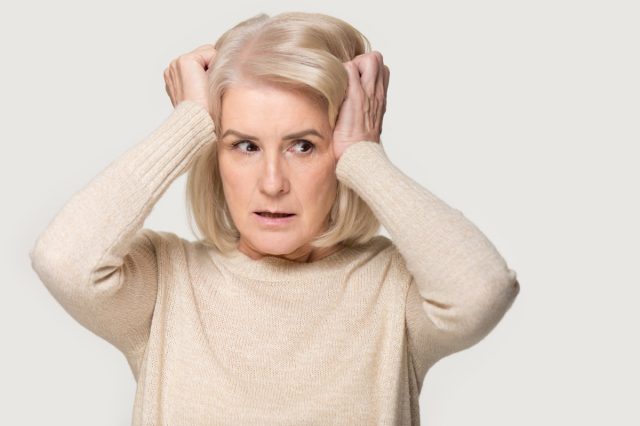Is your medication interfering with your sleep? "Certain medications have the potential to affect a person's sleep," says Dr. Michael Breus. "Some drugs help people sleep better. However, many medications, from cold and flu remedies to cancer treatments, can cause insomnia, making it hard to fall or stay asleep." Always consult with your doctor before making any changes to medication. Here are five medications that can interfere with sleep.
Antidepressants

Some antidepressants can interfere with sleep, experts warn. "SSRIs — or selective serotonin reuptake inhibitors — are a specific type of antidepressant that increases your brain's serotonin levels. Serotonin helps improve your mood and sense of well-being," says Megan N. Freeland, PharmD, RPh. "SSRIs, such as fluoxetine (Prozac), are some of the most commonly prescribed antidepressants. But even though they're quite effective against depression, they can also make it hard to fall asleep and stay asleep. If your healthcare provider agrees, consider taking your SSRI antidepressant in the morning or switching to an antidepressant that makes sleep a bit easier. Trazodone (Desyrel) or mirtazapine (Remeron) might be better options for you."
Beta Blockers

Beta blockers are usually prescribed to treat high blood pressure and arrhythmias. "Beta-blockers have long been associated with sleep disturbances, including awakenings at night and nightmares," says Armon B. Neel, Jr., PharmD. "They are thought to do this by inhibiting the nighttime secretion of melatonin, a hormone involved in regulating both sleep and the body's circadian clock. Low levels of melatonin have sometimes been observed in chronic insomnia. For older people, benzothiazepine calcium channel blockers, another form of blood pressure medication, are often safer and more effective than beta-blockers. A nightly dose of melatonin may also help."
Nicotine Patches

Be careful of when you use nicotine patches—too close to bedtime and you could be facing a restless night. "Nicotine replacement therapies are designed to help you quit smoking by providing you with a low amount of nicotine — just enough to avoid withdrawal symptoms," says Dr. Freeland. "As it turns out, the nicotine patch can cause insomnia if you leave it on overnight. You may try taking your patch off overnight to avoid this side effect.
Cold Medication

"Over-the-counter cold medications often contain a decongestant drug called pseudoephedrine, which can reduce nasal congestion," says Dr. Breus. "Pseudoephedrine is known to cause insomnia, even when it is used in the form of a nasal spray. Some allergy medications called antihistamines promote sleep, so pseudoephedrine may be added to them to prevent drowsiness. As a result, antihistamines that are marketed as 'non-drowsy' or containing a decongestant may interfere with sleep."
Cholinesterase Inhibitors

Cholinesterase inhibitors are commonly prescribed to treat memory loss and other symptoms associated with dementia. "These drugs are thought to work by inhibiting the enzyme in the body that breaks down acetylcholine (a neurotransmitter that's important for alertness, memory, thought and judgment) and thus boosting the amount available to brain cells," says Dr. Neel. "This, in theory, slows the patient's loss of memory and helps him or her perform daily activities with fewer problems. But blocking the breakdown of acetylcholine — which is everywhere in the body, not just in the brain — can interfere with all kinds of involuntary body processes and movements, including those related to sleep."
No comments:
Post a Comment